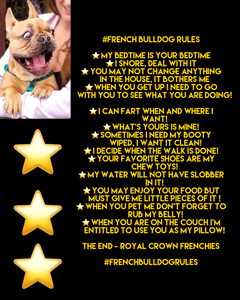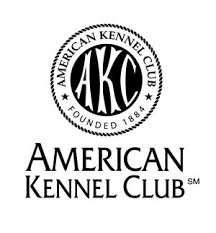When you receive your Frenchie puppy, he/she will be up to date on all immunizations, dewormings, preventive treatments for coccidia and giardia, and will have had a thorough veterinary examination. This information will all be in the packet you will receive when you obtain your puppy.
We immunize with Vanguard Plus 5 (which comes highly recommended by our vet) – and we have been very happy with it. Vanguard Plus 5 is a modified live virus for vaccination of healthy dogs 6 weeks of age or older as an aid in preventing canine distemper caused by canine distemper (CD) virus, infectious canine hepatitis (ICH) caused by canine adenovirus type 1 (CAV-1), respiratory disease caused by canine adenovirus type 2 (CAV-2), canine parainfluenza caused by canine parainfluenza (CPI) virus, and canine parvoviral enteritis caused by canine parvovirus (CPV).
Healthy dogs 6 weeks of age or older should receive 3 doses, each administered 3 weeks apart. We keep all of our puppies up-to-date on all of their immunizations – they are given at 6,9, and 12 weeks of age. If you receive your puppy at 8 weeks of age, then he/she will have just had the first vaccination. If you receive your puppy at 9-11 weeks, he or she will have had the first two vaccinations. If you receive your puppy on or after 12 weeks, he or she will have completed the whole series and will be good for a year – after which yearly booster shots are generally given(1). However, your puppy will still need his/her rabies shot given at 15 weeks of age (if your puppy is 15 weeks of age or older when purchased from us, he/she will have already had the rabies shot). Most of you will receive your new puppy around 8 or 9 weeks of age and it is important that you take your Frenchie to your vet to receive the rest of the immunizations per schedule.
(1) Annual revaccination with a single dose is recommended by Pfizer, although the American Veterinary Medical Association and its Council on Biologic and Therapeutic Agents recommend that the attending veterinarian should determine the frequency of revaccination based on the animal’s lifestyle and risk of exposure. This is only one of the reasons why it is critical to establish a good relationship with a qualified vet as soon as possible. (It should be noted that there are many well renoun experts in the field who feel that a yearly booster for dogs is excessive since the protection provided by the vaccination lasts several years in many cases and they feel that unnecessary vaccinations can do more harm than good – yet another good reason to establish a positive veterinary relationship.)












